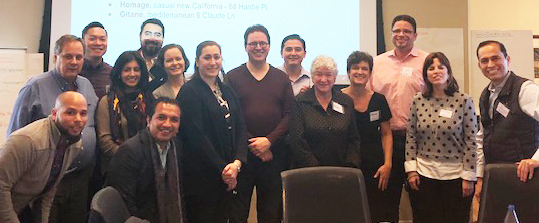Catalyst @ Penn GSE Education Entrepreneurship certificate program in San Francisco brings together education, technology, and business
Tecnológico de Monterrey has a long history of innovating. The university was founded in the 1940s to train the next generation of engineers and technical specialists. It was one of the first universities in Mexico to be internationally accredited or invest in computer learning programs.
But, Paris Gómez Vázquez, Dean of the School of Humanities and Education, Central Region, said that Tecnológico de Monterrey is now undergoing the “most important transformation” in school history. Gómez Vázquez and his colleagues are designing a disruptive educational model that will further differentiate Tecnológico de Monterrey from other universities in Mexico and around the world.
The workshop, hosted at Wharton San Francisco, drew together participants working in the K-12, higher education, and corporate learning spaces. Penn GSE faculty and industry experts worked with participants to develop knowledge, skills, and tools to seed entrepreneurial practice and create impactful and sustainable solutions in education.
The certificate program builds on Penn GSE’s proven track record of supporting innovators who want to make meaningful, research-driven changes in education, including offering the U.S.’s first master’s degree in education entrepreneurship and hosting the oldest and best funded education business plan competition.
“This certificate is another way Penn GSE is using its unparalleled experience in education entrepreneurship to bring together educators and business people who are committed to making change in education,” said Penn GSE Dean Pam Grossman. “We look forward to leveraging our history and expertise with programs like this to have a global impact on education.”
Participants worked on real-world problems at their institutions using agile-process design sprints, explored lean startup tools, and created entrepreneurship profiles for their institutions. At field trips to Apple, Google, and Raise Labs and with visiting guests, they heard journey stories of success, challenges, and failures. The week culminated in a final pitch event.
The certificate program was designed to be practical and relevant for every participant, according to Catalyst @ Penn GSE Executive Director Michael Golden.
“We customized the program to fit the needs and interests of the attendees,” Golden said. “For the participants who work in higher education, for example, we helped them think about how they could put their ideas into action in cultures that can be resistant to innovation.”
In the design sprints, participants attacked challenges that they are trying to overcome at their institutions. They prototyped solutions and left with a data-driven understanding of what might work, what might not, and why.
For Gómez Vázquez, the experience was invaluable.
“Every activity took my university’s project into consideration, allowing us to make real progress,” Gómez Vázquez said. “The experience gave me refreshed energy. Our team returned to campus ready to push ahead with our new educational model.”
